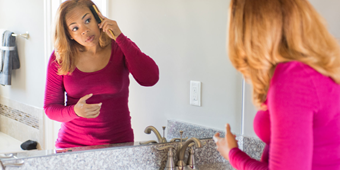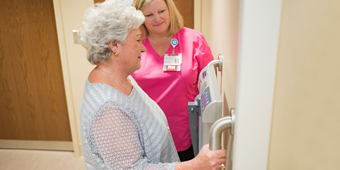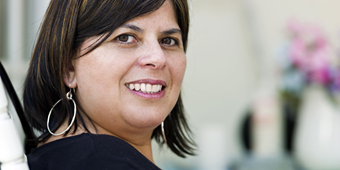Good Body Image Is Good For Your Health

Answer a few questions and we'll provide you with a list of primary care providers that best fit your needs.
How you feel about the way you look. How you feel in your own skin. These personal perceptions form your body image.
And according to the Office of Women’s Health of the U.S. Department of Health and Human Services, when you have a good, positive body image – you feel comfortable in your body and feel good about how you look – you’re more likely to have good physical and mental health.
A negative body image, on the other hand, puts you at risk for mental health conditions like depression or an eating disorder.
How To Build a Positive Body Image
Unrealistic goals, social and family pressures, and the impact of social media all play a role in how you develop a negative or positive body image.
A healthy social life, a healthy diet, and how you talk about yourself can counter the negative influences – and boost your self-confidence and body image. To help build a positive body image:
- Surround yourself with family and friends who are diverse, positive, happy, and make you feel good.
- Engage with people in real life rather than spending hours on social media, where unrealistic body ideals are prevalent.
- Follow a healthy eating plan and exercise regularly. For some women with a poor body image, healthy lifestyle changes can quickly spiral out of control, leading to an eating disorder or too much exercise, which can be dangerous. So, see your health care provider for guidance, which may include a recommendation to work with a nutritionist and a fitness professional.
- Pay attention to how you talk about yourself and your body in front of your children. Be aware that children whose parents diet or who have a negative body image are more likely to develop unhealthy thoughts about their own bodies. And studies show that daughters are twice as likely to have ideas about dieting when their mothers diet.
 Unrealistic Social Ideals Impact Self Image
Unrealistic Social Ideals Impact Self Image
Many women in the United States feel pressured to measure up to strict ideals of beauty ideals, such as being thin and looking young.
Trying to achieve this ideal image can lead to a negative body image, especially among girls.
Girls are bombarded with messages about how they look for most of their lives. Examples include:
- Young girls and teens being praised for how they look rather than for their thoughts or actions
- The media focusing on women who are thin, attractive, and young – and often editing their photographs with computer technology.
You are more likely to have a negative body image if you:
- Were teased or bullied as a child for how you looked
- Were told you’re unattractive, too fat, or too thin, or had other aspects of your appearance criticized
- Saw images or messages in the media (including social media) that make you feel bad about how you look
- Are underweight, overweight, or obese
While weight is a key part of body image, it’s not the only factor. Some women who are overweight are comfortable with their bodies, while some women at a healthy weight may have a negative body image.
Women who are obese or overweight are more likely to have a negative body image. Underweight women may also be dissatisfied with their appearance, especially if others comment on their weight.
Health conditions also impact how you view your appearance. For example, if you are living with cancer, talk to your doctor about ways to feel better about how you look, especially after cancer treatment.
Even menopause can influence your body image. The physical, emotional, and social changes that accompany menopause can impact how you view your body. If you experience menopause at an early age because of surgery or chemotherapy, you may experience an even greater effect on your self-perception.
When you have a good, positive body image – you feel comfortable in your body and feel good about how you look – you’re more likely to have good physical and mental health.
4 Ways To Improve Your Body Image
1. Compliment yourself and loved ones:
- Praise your children for their accomplishments that have nothing to do with physical appearance or physical abilities.
- Write down a Top 10 list of things you like about yourself. Include items unrelated to weight or looks. Read the list often.
- Remember that true beauty is about your self-confidence, openness to feeling beautiful, and the way you carry yourself.
- Think positive thoughts about yourself. How you look is only one part of who you are. Accepting how you look is healthier than trying to change how you look.
2. Follow a healthy eating plan:
- Focus on eating healthy foods instead of dieting.
- Teach your children about smart food choices and help them develop healthy eating and exercise habits by cooking and doing activities together.
- Your meals should include:
- Fruits
- Vegetables
- Whole grains
- Nuts and seeds
- Protein foods including meat, fish, tofu, beans, and lentils
- Vegetable oils
- Fat-free or low-fat milk or nondairy substitutes, yogurt and cheese, or fortified plant-based alternatives
- Occasional sweet and salty foods such as chips, chocolate, and ice cream.
3. Stay physically active: Exercise and physical activity help boost body image, alleviate stress, and help you feel better, whether you lose weight or not:
- Get at least 30 minutes of moderate intensity exercise most days of the week, such as walking, jogging, biking, or dancing.
- Do resistance training or weight bearing exercises two days a week to build muscles and bones. Try using weights and rubber resistance bands and doing squats and push-ups.
- Try gym classes and sports as fun and social ways to enjoy the benefits of physical activity.
4. Feed your soul:
- Engage in enjoyable activities that make you feel good about yourself.
- Social, relaxing, or spiritual activities can reduce stress and anxiety.
- Stay active to avoid negative energy that may lead to worries about food, your looks, or your weight.
- Spend free time volunteering or helping others. This will help you feel good about who you are and what you’re doing.
Answer a few questions and we'll provide you with a list of primary care providers that best fit your needs.
Sources: Women’s Health.gov; Academy of Nutrition and Dietetics; North American Menopause Society; Health and Human Services Administration’s Office of Women’s Health; National Eating Disorder Association




